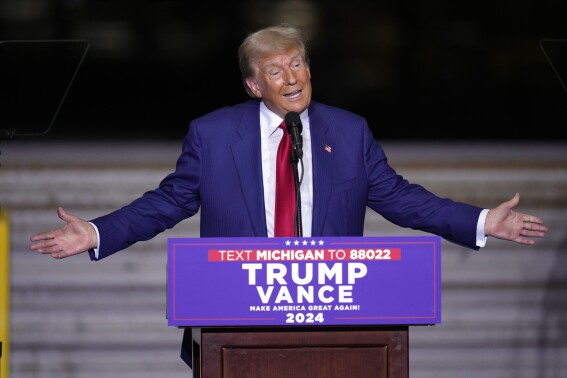Donald Trump has made a bold promise to provide free in vitro fertilization (IVF) for all women and has expressed criticism of Florida’s six-week abortion ban, in a move that appears aimed at reshaping his image as a defender of reproductive rights.
During a campaign stop in Potterville, Michigan, a crucial battleground state, Trump announced that if re-elected, he would mandate that either the government or insurance companies cover all IVF costs. “We want more babies,” Trump stated, acknowledging the high costs associated with IVF treatments and emphasizing his long-standing support for the procedure.

However, Trump did not provide details on how he plans to fund this initiative. He also proposed allowing new parents to deduct significant newborn-related expenses from their taxes.
In a separate interview with NBC News, Trump criticized the six-week abortion ban signed by Florida Governor Ron DeSantis, calling the timeframe “too short” and suggesting that more time should be allowed for abortions. Trump also hinted that he might support an upcoming Florida ballot measure to guarantee abortion rights until fetal viability, although a campaign adviser later clarified that Trump had not explicitly committed to backing the measure.
Trump’s recent comments appear to be part of a broader strategy to moderate the Republican Party’s stance on reproductive issues, which has been a point of contention for many women voters. On Friday, Trump posted on his Truth Social platform, asserting that his administration would be supportive of women’s reproductive rights.
Meanwhile, Kamala Harris, the Democratic candidate, has continued to portray Trump as a threat to women’s rights, including access to abortion, birth control, and fertility treatments. Addressing supporters in Georgia, Harris reiterated that she would sign a bill restoring reproductive freedom if elected president.
Senator JD Vance, Trump’s running mate, further complicated the issue by telling NBC News that Trump would veto a national abortion ban if Congress passed one.
Opinion polls indicate that Trump has seen a decline in support among women voters since Harris became the Democratic nominee. A recent Reuters/Ipsos poll shows Harris leading Trump by 13 percentage points among women, up from a nine-point lead in July.
Trump’s effort to present a more moderate position on reproductive issues could enhance his appeal among some voters, but it also risks alienating the religious and anti-abortion base of the Republican Party. Critics within his own party argue that Trump’s increasingly liberal stance on abortion could undermine his support among pro-life advocates.
Leave a Reply